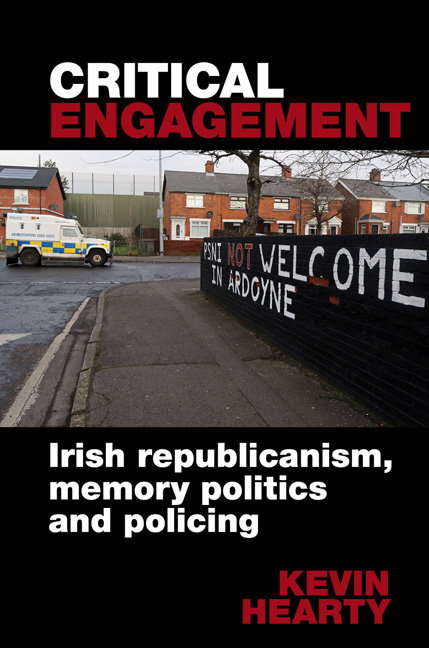Book contents
- Frontmatter
- Contents
- Acknowledgements
- List of Figures and Tables
- List of Abbreviations
- Introduction
- 1 Understanding a Fraught Historical Relationship
- 2 Irish Republican Memory as Counter-Memory
- 3 Ideology and Policing
- 4 The Patriot Dead
- 5 Transition, ‘Never Again’ and ‘Moving On’
- 6 The PSNI and ‘Community Policing’
- 7 The PSNI and ‘Political Policing’
- Conclusion
- References
- Index
3 - Ideology and Policing
- Frontmatter
- Contents
- Acknowledgements
- List of Figures and Tables
- List of Abbreviations
- Introduction
- 1 Understanding a Fraught Historical Relationship
- 2 Irish Republican Memory as Counter-Memory
- 3 Ideology and Policing
- 4 The Patriot Dead
- 5 Transition, ‘Never Again’ and ‘Moving On’
- 6 The PSNI and ‘Community Policing’
- 7 The PSNI and ‘Political Policing’
- Conclusion
- References
- Index
Summary
Introduction
The policing debate was not the starting point of ideological contestation within modern Irish republicanism. As such, it must be mapped onto a bigger picture of contestation over the past within contemporary Irish republicanism. This chapter therefore interrogates how competing views of where Irish republicanism is currently at in transition and where it is believed to be heading are construed through value-laden interpretations of where it has come from. Locating the policing debate within this wider ideological context, two contesting ideological models of the current Sinn Féin strategy in Northern Ireland are proffered: the ‘progressive republican’ model and the ‘constitutional nationalist’ model. Irreconcilability between these models has generated intense ideological debate over what constitutes principles and what constitutes tactics, as well as disagreement over what represents continuity with traditional ideology and what is a rupture from it. Before delving deeper into this ideological debate, it is necessary to outline briefly the historical development of Irish republicanism. An exhaustive historical review is beyond the parameters of this book, yet it is nonetheless necessary to provide some historical context in order to allow present ideological debate within Irish republicanism to be understood.
Historical development
Irish republicanism is invariably traced back to Theobald Wolfe Tone and the Society of United Irishmen. This lineage itself arguably contains an element of myth because the Society of United Irishmen was initially a political club aimed at political reform that only opted for conspiratorial revolution in line with developments in France. Their initial aim was the unity of the Irish people via equality rather than through the ending of English occupation. By 1798, however, their aim had become to ‘break the connection with England’. This formed the basis of a narrative that has been handed down through successive generations within the ‘republican tradition’. Ensnared in the third wave of major international revolt during the closing stages of 1848, the Young Ireland movement tried to resurrect the United Irishmen's aim of breaking the English connection through violent revolt. Young Ireland rebellion solidified the concept of using physical force, which by the Fenian era was a well-established concept in Irish republican ideology. English notes that ‘the Fenians were not asking for what England might give, but were demanding what was rightfully theirs, and were prepared to take it by force’.
- Type
- Chapter
- Information
- Critical EngagementIrish republicanism, memory politics and policing, pp. 87 - 120Publisher: Liverpool University PressPrint publication year: 2017



